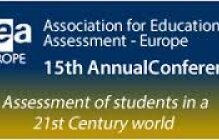15th Annual AEA-Europe “Assessment of students in the 21st Century World”
Jue, 06/11/2014 - Sáb, 08/11/2014
The 15th Annual AEA-Europe conference will be held in Tallinn, Estonia, on 6 – 8th November 2014. This will provide an opportunity for advancing ideas across Europe and beyond on the conference theme, including:
- Challenges of the 21st century for the field of assessment
- Assessment of skills emphasised in modern societies
- Technological advances in assessment
- Novel assessment designs for the 21st century
- Assessing co-operation, team work and problem solving
- E-assessment
- Assessment of personal qualities such as communication skills
- Artificial intelligence and assessment
- Assessing creativity
- Cross-cultural understandings of assessment of 21st century skills
- Adaptive testing
Life in the 21st century world requires competences such as adaptability, creativity, critical thinking, communication, IT, decision-making, and team working. Educational assessment researchers and organisations are therefore adapting to assess both traditional and these “new” knowledges and skills.
Emerging trends in assessment are highly evident in two areas – in what we attempt to assess and in how assessment is designed and delivered. Co-operative problem solving is one example of a skill that has always been valued by society, and that we now want to assess in order to understand how young people are prepared for life. As such, advances in assessment are being made in the theoretical underpinnings, description of constructs and assessment frameworks, as well as in modes of assessing and scoring.
Traditionally, much emphasis has been put on assessing knowledge such as mathematical knowledge or the demands of a foreign language. These forms of knowledge, although traditional, are central to participation in 21st century society.Here, we are witnessing developments in how these powerful forms of knowledge are being assessed and the use of technology in examination logistics has grown dramatically.
For some time the debate has centred on the modernising of curricula, improving teaching methods, and reconceptualising assessment. However, when discussing assessment for the 21st century world, we need to discuss how the traditional knowledge that is taught and assessed in schools is related to the competences and skills needed for participation in the 21st century world.Indeed, the discussion needs to centre on how assessment can be designed, delivered and understood to accommodate both traditional and “new” knowledge in a 21st century context.
Workshops: The following workshops will be held on 5th November, prior to the start of the conference:
- - The development and assessment of 21st century professional skills and how this connects with feedback, learning and ICT. Stephen Dobson, Vegard Meland and Egil Hartberg
- - Assessing the Impact of Educational Intervention using Creative Tests and Comparative Judgement. Chris Wheadon and Ian Jones
- - Applications of Item Response Theory. Theo Eggen and Frans Kleintjes
- - How to Assess What's Important. Alastair Pollitt and Ayesha Ahmed
- Conference website


















